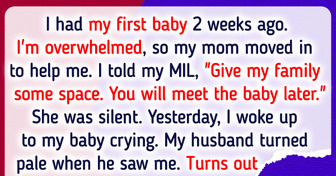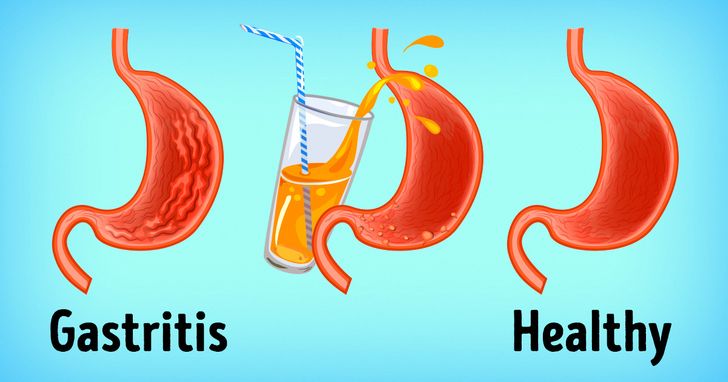I actually have had h-pylori twice and think I actually have it again..... it will be interesting to see if these ‘remedies’ work...? Anything is worth a try, didn’t think it would be something I would suffer with for some years?
6 Foods to Eat and 7 to Avoid If You’re Suffering From Gastritis
Food itself rarely causes gastritis. The leading cause of gastritis is the Helicobacter pylori infection. However, some foods can aggravate the symptoms by irritating the stomach lining, while other foods can minimize the discomfort and even help treat the painful condition.
Here at Bright Side, we researched the most beneficial foods to eat if you have gastritis, as well as foods you should stay away from.
Gastritis is the inflammation or irritation of the stomach lining. Sometimes it manifests itself without any symptoms, but when there are symptoms, they can be quite unpleasant and include abdominal pain and bloating, nausea, indigestion, and loss of appetite. In some cases, H. pylori-induced gastritis can lead to ulcers and even stomach cancer if left untreated.
Foods you can eat if you’re suffering from gastritis include:
-
High-fiber foods
High-fiber foods like nuts and seeds, legumes, berries, and green vegetables are beneficial for the whole digestive system, so it’s no wonder a gastritis diet is a diet high in fiber. Broccoli is especially important for gastric health: besides being a good source of fiber, it also contains high levels of sulforaphane, a compound that kills the H. pylori bacteria.
-
Foods rich in healthy fats
While fatty foods aren’t the best choice for someone suffering from gastritis, foods rich in healthy fats are definitely an exception. Omega-3 fatty acids found in salmon, sardines, walnuts, and chia seeds help reduce inflammation of the stomach lining and even have a preventive effect against H. pylori-induced gastritis and other gastric disorders. Other sources of healthy fats are avocados, olive oil, and different nuts and seeds.
-
Probiotic foods and drinks
If you have gastritis, probiotics such as yogurt, kefir, kimchi, kombucha, and sauerkraut can help in several ways. First, being bacteria themselves (the good kind), they fight the H. pylori bacteria for space and food and decrease its load. Second, they boost your immune system, helping it fight the disease. Third, they increase the gut’s ability to absorb the nutrients needed for a successful recovery.
-
Foods rich in lean protein
Protein helps repair the damage done by gastritis to the stomach lining. However, not all proteins are equal. It’s important to choose lean proteins when suffering from gastritis because the fat in animal products (with the exception of omega-3-rich fatty fish) can only make the condition worse. Good sources of lean protein include chicken and turkey breast, egg whites, tuna, and beans.
-
Antibacterial and flavonoid-rich foods
Since H. pylori is a type of bacteria, it’s only logical to fight it with something antibacterial. Flavonoids are known for their antibacterial properties, inhibiting the growth of many types of bacteria, including H. pylori. Garlic, onions, cranberries, and celery are all great sources of flavonoids. Some other common antibacterial foods are honey, ginger, and turmeric.
-
Vegetable drinks
While fruit juices aren’t recommended for people with gastritis (due to high levels of sugar and acid with none of the fiber), some vegetable juices and smoothies are a different story. Potato juice, for example, has antioxidative properties and can relieve stomach pain. Pumpkin juice, besides being very rich in nutrients, can actually decrease gastric acidity, helping the stomach lining heal faster.
Here are some foods it’s best to avoid if you’re suffering from gastritis:
-
Acidic foods and drinks
When it comes to foods and drinks that cause higher acidity in the body, some are a no-brainer. Everyone knows cola and excessive sugar are bad for you, and citrus fruit and juices are definitely acidic, right? But not everyone knows that other, seemingly innocuous foods can also irritate the stomach lining. Coffee, grains, and even otherwise healthy and antioxidant-rich tomatoes are also considered acidic and their consumption can aggravate the condition even further.
-
Fried and fatty foods
High levels of cholesterol found in fried and high-fat foods have been linked to increased incidence of gastritis, making it one of the rare cases of food actually causing this disease. Naturally, if you already suffer from gastritis, it’s best to avoid these foods to prevent the condition from getting worse.
-
Carbonated drinks
It’s usually recommended to avoid all carbonated drinks to relieve the painful symptoms of gastritis. Obviously, soda is the worst offender in this category, with its high acidity and sugar load making it one of the unhealthiest drinks, overall. Seemingly healthy sparkling water is also not optimal for gastric health: after you take a sip, carbon dioxide turns into irritating carbonic acid, responsible for sparkling water’s “bite.”
-
Spicy and heavily seasoned foods
This is a really simple one: spicy foods and seasonings like hot peppers, wasabi, horseradish, and mustard add “flame” to an already inflamed stomach, instantly making the pain worse. However, it’s important not to exclude seasonings all together, as some can be quite beneficial when dealing with gastritis. Cinnamon, turmeric, and ginger, among others, are known to combat harmful bacteria.
-
Processed foods and fast food
In addition to often being fried and deep-fried, fast food usually contains preservatives and artificial flavorings that can irritate the stomach. The same goes for processed foods and ready-made meals: for example, excessive consumption of monosodium glutamate, found in most of these foods, leads to gastritis and other gastric disorders.
-
Non-steroidal anti-inflammatory drugs
Commonly used NSAIDs like aspirin, ibuprofen, diclofenac, and naproxen aren’t technically foods, but, being one of the main causes of gastritis, they still deserve to be mentioned in this list. They affect the stomach lining the same way that alcohol does and, just like alcohol, they shouldn’t be used during the treatment of gastritis.
Do you suffer from gastritis? Do you have any useful tips? We’d love to hear them in the comments!
Comments
Related Reads
I Hated the Surprise Birthday Party My Husband Threw Me and Now I Want a Divorce

I Denied My MIL Access to My Baby—So She Dared to “Teach Me a Lesson”

12 Single Dads Share Their Most Emotional Stories

My Son Brought His Fiancée Home — What I Discovered Made Me Call the Police

9 People Share Impossible Events That Horrified Them to Their Core

I Had to Choose Between My Pregnant New Wife and My Daughter

10 Real Stories With Twists So Intense They Can Make Your Heart Rate Spike

I Caught on Camera What My MIL Was Doing While Babysitting My Kid, And I Don’t Know What to Think

I Threw My MIL Out of My Wedding After Opening Her Humiliating Gift

10 Family Conflict Stories That Will Leave You Shocked

People Shared 20+ Images to Show That the Power of a Good Clean Can Do Wonders

My In-Laws Begged Me to Get Back to Their Son, but I Told Them the Embarrassing Truth About Him


